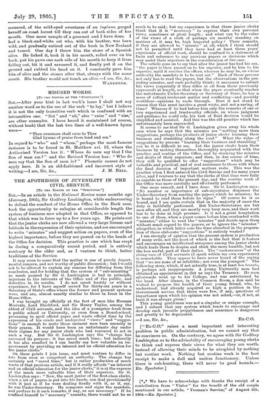SIR,—Touching the part of your interesting article, "Dainty Animals," in
the Spectator of July 15th, referring to the rein- deer and the lemming, it is curious that sheep in South Africa feed greedily on the locust; possibly for the cause suggested by you in the case of the lemming, for the locust is always full of grass. I think, however, there must be a greater attraction in the oiliness of the locust, which comes out strongly when it is fried by the natives for food. It is curious that not only the native-born South African sheep have this taste. Some South Down and cross-bred sheep only imported about four months previously were seen eating them also, though they were scrupulously herded and camped away from the native sheep, and never mixed with them. This was in winter, when the locusts get so chilled at night that until the sun has warmed them they are unable to fly. Confirming the theory that the rich fat taste of the locust must be attractive, the sheep eat them greedily when driven as " foot-gangers " into close mobs and burnt by the natives. My son writes me, too, that a mule called Baby,' a delightful character, of unspeak- able cunning, of inexhaustible fighting power, and, when cornered, of the mild-eyed sweetness of an inganue, gorged herself on roast locust till they ran out of both sides of her mouth. One more sample of a gourmet and I have done. I had a black-and-white cat who, with his brother, was born wild, and gradually enticed out of the bush in New Zealand and tamed. One day I threw him the stone of a Spanish olive. He.licked it, took it in his mouth, rolled over on his back, put his paws one each side of his mouth to keep it from falling out, bit it and savoured it, and finally put it on the ground and rubbed his head on it. I constantly gave him bits of olive and the stones after that, always with the same result. His brother would not touch an olive.—I am, Sir, &c.,
WANDERER.







































 Previous page
Previous page